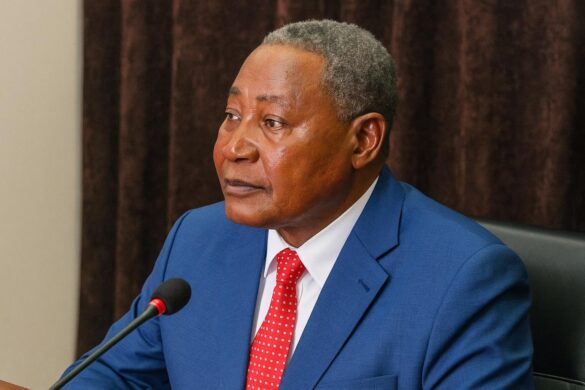Electoral Plan Presentation
On October 9, 2025, Deputy Minister Dominique Basseyla presented what he called a “decisive phase” toward the legislative and presidential elections scheduled for March 2026.
The Commissioner General of the ad hoc committee tasked with monitoring the implementation of the 2015 Sibiti Dialogue recommendations presented this meeting as a routine assessment, but its proposals – primarily the creation of one or two vice-presidential positions – quickly dominated the political debate in Brazzaville.
Surrounded by advisors, Basseyla reiterated that the committee’s mandate is to ensure continuity between the Sibiti consensus, the October 25, 2015 Constitution, and the upcoming elections, insisting that institutional stability remains the “oxygen of development” and that the government’s deadlines will be met.
Vice-Presidency Proposal Sparks Governance Debate
Basseyla’s central suggestion is to integrate a vice-presidency into the constitutional architecture. In the single-post option, a politically significant deputy would be chosen by the head of state, assume presidential functions in case of incapacity, and manage thematic portfolios or international representation at the president’s discretion.
The two-post option would assign a second vice-president to oversee government coordination, thereby replacing the prime minister. Both officials, he said, would be appointed by decree, ensuring unity of command while giving formal recognition to regional and ideological balance within the executive branch.
Three Ideological Blocs to Streamline Parties
The committee also wants political parties to be grouped into three ideological families – Republican, Social-Democrat, and Centrist. According to Basseyla, existing formations would retain their identity but would have to affiliate with a bloc, while future registrations would follow the same rule, a measure he described as a “necessary rationalization.”
He dismissed speculation about forced dissolutions, emphasizing that pluralism would be preserved within each bloc. “No organization will be asked to disappear,” he maintained, stating that converging platforms would help voters compare programs and allow authorities to distribute public funding more transparently.
Promotion of Proportional Voting for 2026
To translate the three-bloc landscape into parliamentary seats, Basseyla advocates for a nationwide transition to closed-list proportional voting. Each constituency – proposed at the departmental and municipal levels – would see exactly three competing lists, one per bloc, with independent candidacies explicitly excluded.
He argued that proportionality would quantify the actual weight of each political current, providing an objective basis for allocating ministerial portfolios, positions in the Bureaus of both parliamentary chambers, and leadership roles in local councils, thereby reducing post-election disputes.
Institutionalization of CONEL and Biometric Challenge
Regarding electoral governance, Basseyla welcomed the institutionalization of the National Independent Electoral Commission, CONEL, which the committee wants to enshrine constitutionally to guarantee financial and managerial autonomy, as well as insulation from external or partisan pressures.
He nevertheless acknowledged that the biometric voter registration project is behind schedule. “The prerequisites have not been effectively met,” he conceded, urging rapid technical assessments and public-private partnerships so that the voter lists
